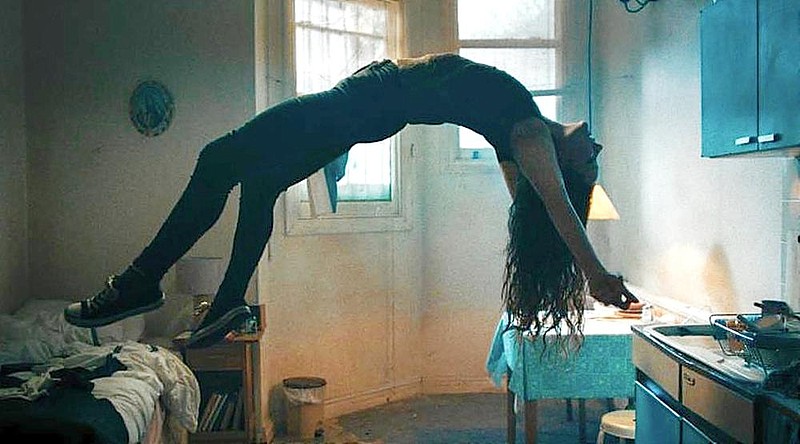The pious British poet and artist William Blake once famously referred to organized religion as an "ugly distortion of a true spiritual life." The more humankind attempts to put measures, limits, and analogues on the divine, the farther we got away from the undistilled truth of the unknowable.
We are humans, we don't so much like to truck with feelings alone, they are too intangible, resistant to description and predictability. It makes us uncomfortable to float in that pool of undefined spirituality, so we work feverishly hard to write scriptures and edicts of God's word, and make symbols out of all the things we can't possibly touch.
Blake's courageous brand of self-attenuated spirituality seeps in throughout "Saint Maud," Rose Glass' commanding feature debut, about a young woman who believes she has found her divine path after a lifetime of feeling lost, and couldn't be farther off the mark.
Maud ( Morfydd Clark), a palliative care nurse, used to work in a hospital, but we are to understand some unspecified tragedy drove her out of the place and into homecare. As we meet her, she has also recently undergone a religious awakening, leaving the former "party girl," neat, respectful, and pindrop quiet. She takes a new assignment on the outskirts of Scarborough, a beachtown, such as it is, in North Yorkshire, to care for a woman named Amanda (Jennifer Ehle), a famous former dancer and choreographer, stricken with advanced spinal cancer that leaves her wheelchair-bound.
Maud's religion appears roughly based in Catholicism (she takes with her a large cross to Amanda's house, wrapped up in a blue towel), but her practices are all her own. Filled with bouts of zealous rapture, often sensual in her heightened state, followed by dutiful, if ill-conceived self-inflictions -- including intentionally burning her hand on a hot stove, and stepping on a bed of tacks -- she, at first seems determined to follow the pathway as it is addressed to her by the melodious voice of her deity.
When it becomes clear to her the divine purpose she has been called upon is to save Amanda's soul before her impending death, she is suffused with joy and intention. At first, her patient, with her constant smoking, boozing, and carousing with old friends -- including Carol, (Lily Frazer), a young woman she pays for intermittent sex -- seems resistant, but soon, through Maud's careful teachings, she begins to come around. That is, until Maud oversteps her bounds with respect to Carol, and falls out of Amanda's favor.
We don't know at first exactly what sort of person she was before, though after a chance meeting with one of her former nurse colleagues (Lily Knight) out in town, we know she used to go by "Katie," and we get the sense she was a bit of a boozer: Every bit the same sort of "lost" she gently accuses Amanda of being.
What Glass, who also wrote the screenplay, begins to reveal as the film continues, is the subtle friction point between the film's perspective and that of its protagonist. Like the thin plastic draping you have to pull off a new glass phone screen, the director slowly peels back the layers just enough for us to understand how subjective the perceptions are we are being given. After all, we too, see Maud, after losing her way again, and reverting back to old, messy, unhinged habits, rise up in the air, as if being held by a giant open hand. We too hear the words of her (unseen) God as they tell her to return to Amanda and complete the task set before her.
It isn't a horror movie in the traditional sense. There aren't any jump scares to speak of, or monsters lurking in the darkness, just past our periphery. The terrors that Glass' film forces us to confront are instead of the psychological variety, and couldn't be more timely in an era half-obsessed with group-think misinformation and rising belief in outrageous conspiracy theories: If the Trump era brought us anything it was a discordancy from any concept of objective truth. After all, many people now believe the Democratic party is a thinly veiled pedophile ring, drinking the blood of babies, and profiting from the proliferation of bogus covid hysteria. That clear plastic scrim adhering with alarming precision over the frame of our cognition, obscuring any sense of clarity.
Maud's beliefs, for the most part, aren't tied into anyone else's. She doesn't get lost in an internet worm-hole, but rather the confused, aching trenches of her own mind. As Glass has it, she could just as well have been a Redditer, or anti-vaxer, supplying image and target as a manifestation of her personal, creeping sense of spiritual malaise. Something, in other words, that feels as tangible as Maud's view of herself as an angel (near the end, she admires the glowing wings that have sprung from between her shoulder blades), and tasked with the heady purpose of deliverance.
Glass plays the film tightly close to her protagonist's consciousness, until the very end, where just for a stunning split second, we are finally given a flash of objective reality. It's easily the most terrifying and shocking frame in the picture, where the world finally intrudes, stripped of all Maud's emotional baggage, her layers of romanticism, and religious dogma: In this exact, horrific moment, all is finally revealed, and Maud's objective truth forever seared in our memory.
More News
‘Saint Maud’
88 Cast: Morfydd Clark, Jennifer Ehle, Lily Frazer, Lily Knight, Marcus Hutton, Turlough Convery, Rosie Sansom, Carl Prekopp, Jonathan Milshaw, Noa Bodner
Director: Rose Glass
Rating: R, for disturbing and violent content, sexual content and language
Running time: 1 hour, 24 minutes
Available for streaming on Epix and Amazon Prime
